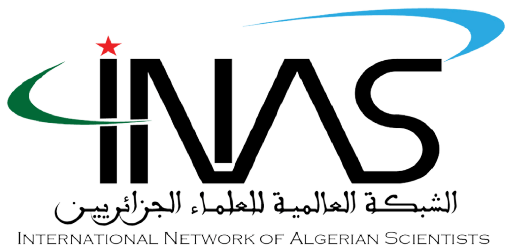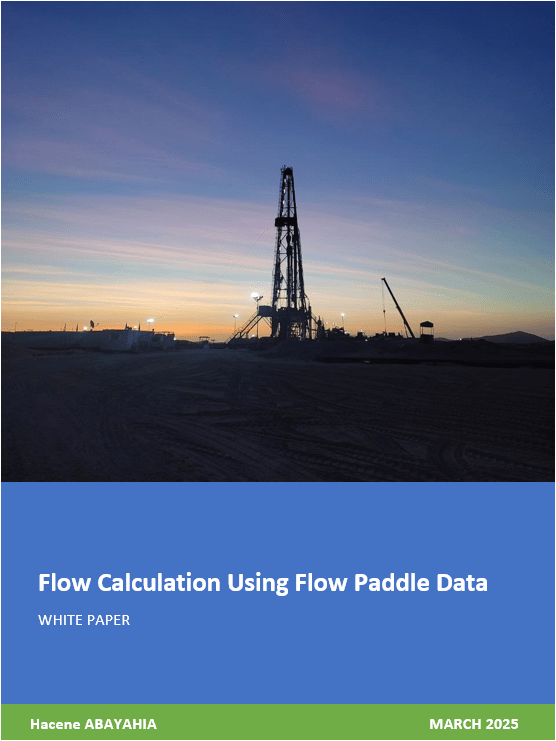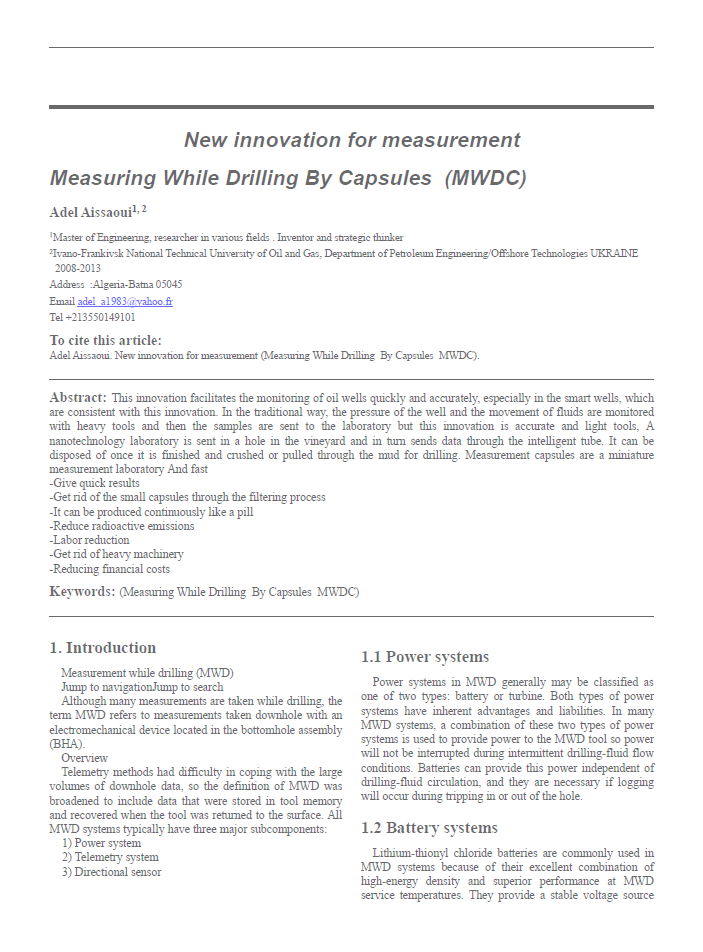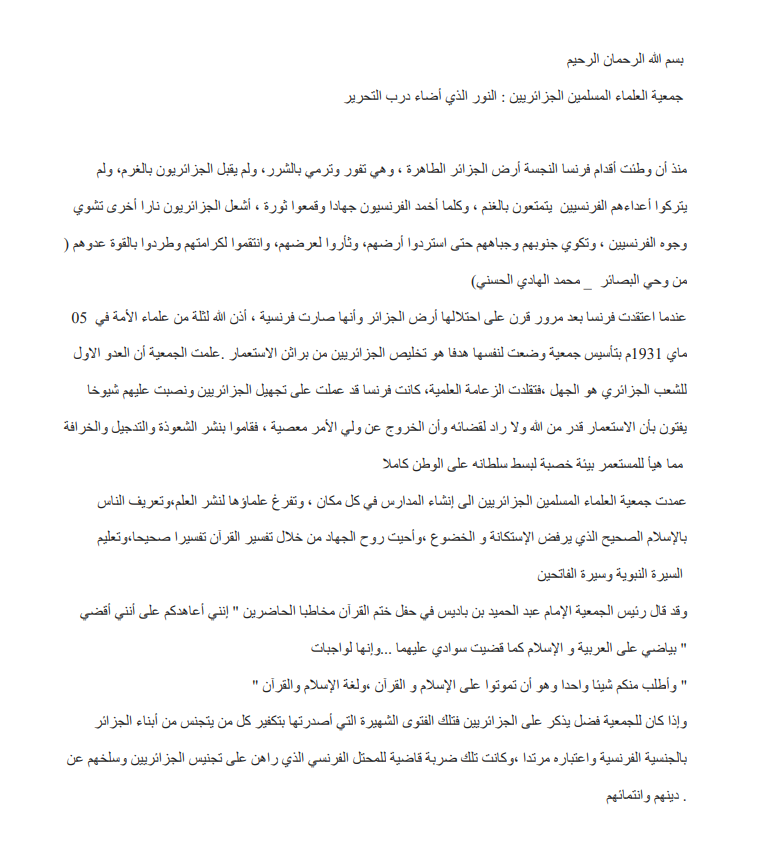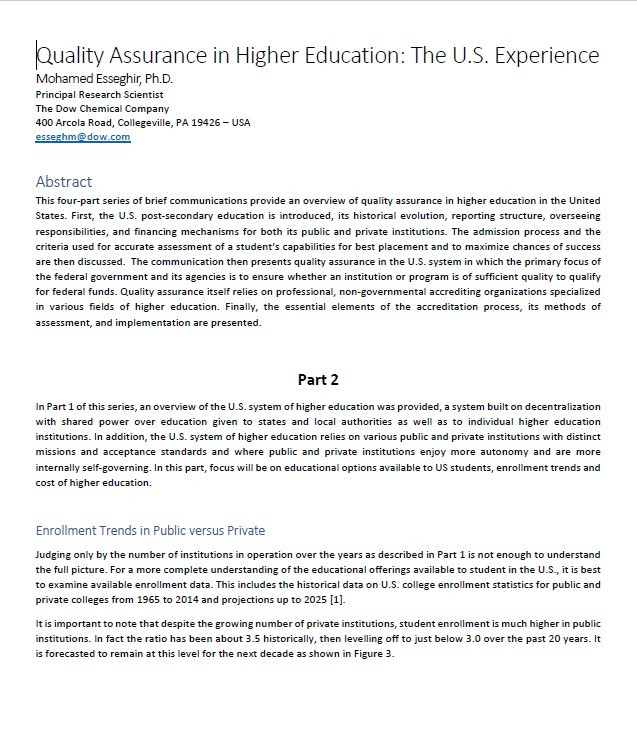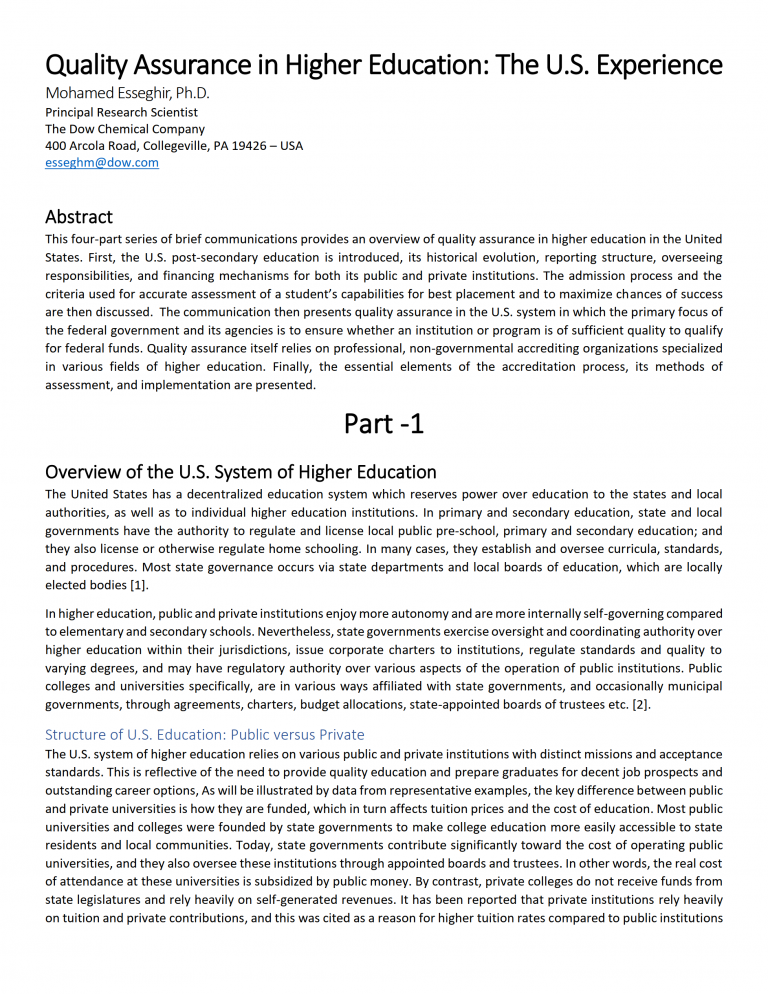Hacene ABAYAHIA
Published on: March 25 2025
Flow out measurement is a critical component in mudlogging operations, as it enables precise monitoring of mud circulation throughout the drilling process.
The accuracy of flow measurement directly impacts the detection of anomalies such as fluid losses or gains, ensuring drilling safety and efficiency.
One commonly used device for flow measurement is the paddle-type flow meter.
This document presents an analysis of the challenges faced in using paddle-type flow meters and proposes a standardized solution to improve flow rate calculation using polynomial regression techniques.
Hacene ABAYAHIA
Published on: March 25 2025
Flow out measurement is a critical component in mudlogging operations, as it enables precise monitoring of mud circulation throughout the drilling process.
The accuracy of flow measurement directly impacts the detection of anomalies such as fluid losses or gains, ensuring drilling safety and efficiency.
One commonly used device for flow measurement is the paddle-type flow meter.
This document presents an analysis of the challenges faced in using paddle-type flow meters and proposes a standardized solution to improve flow rate calculation using polynomial regression techniques.
Dr. CHIBANI Leila
University of Bejaia. Algeria
Published on: March 08 2025
Abstract: Food in human life was and still is an important process, as many scientists and researchers have intervened to propose models for achieving a complete diet, and throughout human history there have been studies that suggest that obtaining adequate or enjoyable food represents a major force in determining daily events and events of importance. In this scientific paper, we will talk about the food choice model from a psychological perspective.
Keywords: food, psychological perspective, dietary behavior, food choice.
Adel Aissaoui
Master of Engineering, researcher in various fields . Inventor and strategic thinker
Ivano-Frankivsk National Technical University of Oil and Gas, Department of Petroleum Engineering/Offshore Technologies
UKRAINE 2008-2013
Published on: November 01 2024
Abstract: This innovation facilitates the monitoring of oil wells quickly and accurately, especially in the smart wells, which are consistent with this innovation. In the traditional way, the pressure of the well and the movement of fluids are monitored with heavy tools and then the samples are sent to the laboratory but this innovation is accurate and light tools, A nanotechnology laboratory is sent in a hole in the vineyard and in turn sends data through the intelligent tube. It can be disposed of once it is finished and crushed or pulled through the mud for drilling. Measurement capsules are a miniature measurement laboratory And fast.
White papers in the Education series
الأستاذ :محمد الصغير دحية
Published on: April 16, 2024
منذ أن وطئت أقدام فرنسا النجسة أرض الجزائر الطاهرة ، وهي تفور وترمي بالشرر، ولم يقبل الجزائريون بالغرم، ولم يتركوا أعداءهم الفرنسيين يتمتعون بالغنم ، وكلما أخمد الفرنسيون جهادا وقمعوا ثورة ، أشعل الجزائريون نارا أخرى تشوي وجوه الفرنسيين ، وتكوي جنوبهم وجباههم حتى استردوا أرضهم، وثأروا لعرضهم، وانتقموا لكرامتهم وطردوا بالقوة عدوهم ( من وحي البصائر _ محمد الهادي الحسني) عندما اعتقدت فرنسا بعد مرور قرن على احتلالها أرض الجزائر وأنها صارت فرنسية ، أذن الله لثلة من علماء الأمة في 05 ماي 1931م بتأسيس جمعية وضعت لنفسها هدفا هو تخليص الجزائريين من براثن الاستعمار .
Mohamed Esseghir, Ph.D.
Principal Research Scientist
The Dow Chemical Company
400 Arcola Road, Collegeville, PA 19426 – USA
Published on: november 29, 2022
This four-part series of brief communications provide an overview of quality assurance in higher education in the United States. First, the U.S. post-secondary education is introduced, its historical evolution, reporting structure, overseeing responsibilities, and financing mechanisms for both its public and private institutions. The admission process and the criteria used for accurate assessment of a student’s capabilities for best placement and to maximize chances of success are then discussed. The communication then presents quality assurance in the U.S. system in which the primary focus of the federal government and its agencies is to ensure whether an institution or program is of sufficient quality to qualify for federal funds. Quality assurance itself relies on professional, non-governmental accrediting organizations specialized in various fields of higher education. Finally, the essential elements of the accreditation process, its methods of assessment, and implementation are presented.
Mohamed Esseghir, Ph.D.
Principal Research Scientist
The Dow Chemical Company
400 Arcola Road, Collegeville, PA 19426 – USA
Published on: november 29, 2022
This four-part series of brief communications provides an overview of quality assurance in higher education in the United States. First, the U.S. post-secondary education is introduced, its historical evolution, reporting structure, overseeing responsibilities, and financing mechanisms for both its public and private institutions. The admission process and the criteria used for accurate assessment of a student’s capabilities for best placement and to maximize chances of success are then discussed. The communication then presents quality assurance in the U.S. system in which the primary focus of the federal government and its agencies is to ensure whether an institution or program is of sufficient quality to qualify for federal funds. Quality assurance itself relies on professional, non-governmental accrediting organizations specialized in various fields of higher education. Finally, the essential elements of the accreditation process, its methods of assessment, and implementation are presented.

CONTRIBUTE
Publish Your Scientific Findings With Us
We are always looking for valuable contributions from researchers and students. Help us enrich our scientific corpus by publishing your findings in INAS journal. We are open to contributions from the education, engineering, architecture, technology, and social science fields.
